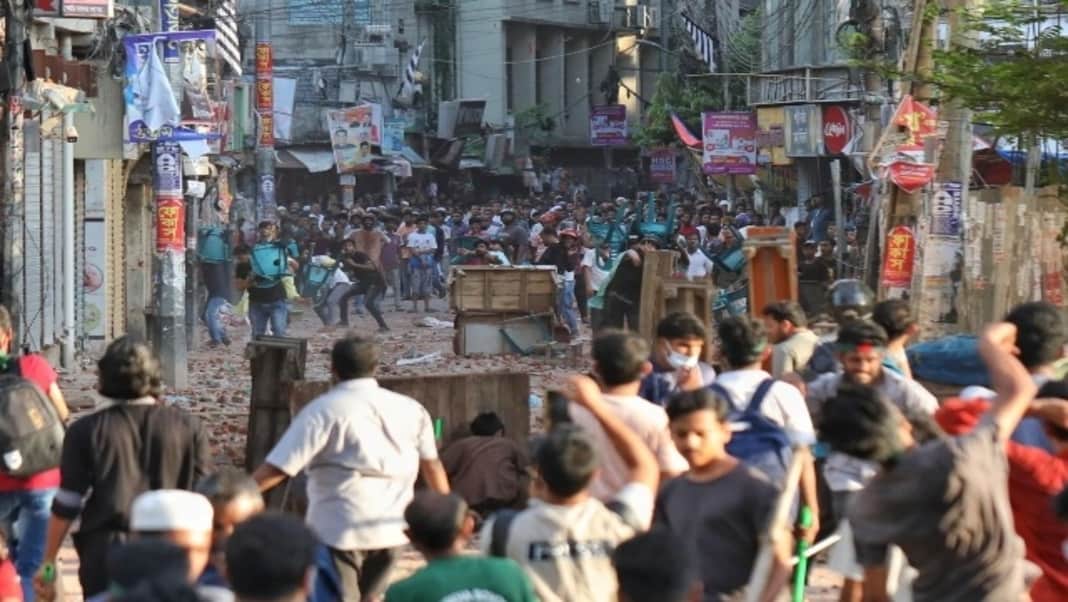GUWAHATI, Aug 7: The potential fall of Prime Minister Sheikh Hasina’s government in Bangladesh could have significant implications for India, particularly the northeastern region, said Bangladesh expert Dr Abu Nasser Syed Ahmed on Tuesday.
“Political instability in Bangladesh could lead to the rise of radical groups within the country. These groups might attempt to expand their network across the border, leading to increased radicalization among vulnerable populations in the Northeast,” Dr Ahmed, a retired professor of humanities and social science of the Indian Institute of Technology (IITG), said.
Dr Ahmed had carried out two research projects on Bangladesh fundamentalist activities and the foundation of Bangladesh (either Islamic or nationalist). Both studies were sponsored by the Ministry of External Affairs, Government of India.

Dr. Ahmed said Northeast shares 4,090 km long border with Bangladesh. In the last years, the Sheikh Hasina government has cooperated with India on security issues, including tackling insurgent groups that operate across the India-Bangladesh border. A change in government could affect this cooperation, potentially leading to increased cross-border insurgency activities.
The Border Security Force (BSF) has already issued a high alert along the India-Bangladesh border due to the deteriorating law and order situation in Bangladesh.
Meghalaya has also imposed a night curfew along the international border.
“Bangladesh Nationalist Party (BNP) and Jamaat-e-Islami have historically been seen as less cooperative with India compared to Sheik Hasina’s Awami League Their rise could lead to a rollback of many bilateral agreements and increased hostility towards India. The potential resurgence of Razakar Forces indicates a return of extremist ideologies that are detrimental to both India and Bangladesh,” he said.
Dr. Ahmed suggested a nuanced threat landscape where the unrest in Bangladesh could potentially be exploited by anti-Indian forces. “While established insurgent groups might find it harder to use Bangladeshi soil due to international pressure and current surveillance, smaller factions or disgruntled elements could still find refuge. This can disrupt peace in the Northeast,” he further said.
Dr Ahmed observed that most insurgent outfits in the Northeast are now more inclined to hold talks with the Indian government rather than seek shelter in a foreign country, which is a positive development. However, the potential rise of fundamental forces in the region due to unrest in Bangladesh remains a concern.
He added that there is potential economic fallout from unrest in Bangladesh, and the involvement of various international players is crucial.
“Political unrest can severely disrupt economic activities, leading to a slowdown in growth. Industries such as textiles, which form the backbone of Bangladesh’s economy, might suffer from decreased productivity, export challenges, and loss of investor confidence,” he further said.
“Unrest can deter foreign investors, who might perceive Bangladesh as a risky environment. This can lead to capital flight, reduced foreign direct investment (FDI), and withdrawal of international businesses,” he added.
Also Read: An eerie calmness in Dawki; Bangladesh Army abandons posts, rampant stone extraction ensues
Watch
Find latest news from every corner of Northeast India at hubnetwork.in, your online source for breaking news, video coverage.
Also, Follow us on-
Twitter-twitter.com/nemediahub
Youtube channel- www.youtube.com/@NortheastMediaHub2020
Instagram- www.instagram.com/ne_media_hub
Download our app from playstore – Northeast Media Hub





